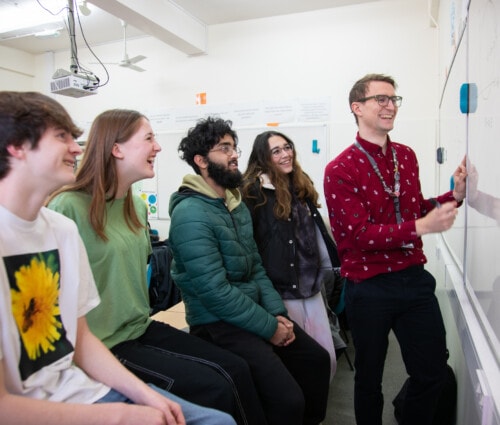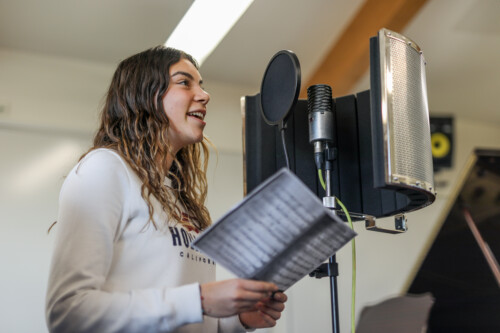What is a Sixth Form College?
We understand the importance of making the right decision on where to study post-16. You have numerous options and lots of information to consider. In the end, the most important thing is to make the choice that is right for you and this means fully understanding what your preferred schools and sixth form colleges are really about.

What is different and distinct about the education each offers? We thought it might be helpful to share some of the most common questions we are asked by prospective Esher Sixth Form College students and their parents to help and inform your decision-making.
What will my relationship with my new teachers be like and how will they get to know me?
Your teachers are very aware they don’t know you at first and they work hard at getting to know you. In our view this should be seen in a positive light, both in terms of new possibilities and the ease with which new relationships are developed.
Here’s what we do:
- In a more mature learning environment, staff-student relationships take a different form (first name terms, for example). Building these relationships is an important step in the transition from school pupil to sixth form college student and an essential part of a swift and well-established ‘getting to know you’ process.
- Your teachers only work with 16-18 year olds and they understand the needs, concerns and interests of your age group. The specialist nature of their job ensures that new relationships are swiftly built.
- You will find that communication with your teachers is of a more personal nature. They are readily available for consultation and regularly respond to individual queries by email.
- There are lots of activities to ensure that new relationships are swiftly established, both in tutor group sessions and in lessons. For example, ‘Your Start at Esher’ (our induction programme) is deliberately arranged on a phased basis to allow students to settle in and relationships to be built. A third of each tutor group attend the first session, which includes a 1-1 ‘get to know you meeting’, and the whole tutor group the second session.
- Your personal tutor looks after your individual needs, progress and welfare. Your parents/guardians will have the opportunity to meet your personal tutor during your first half term at the College.
- From a curriculum perspective, you will complete an induction assignment in each of your subjects which gives teachers an early indication of your starting point and allows for individual feedback.
- You and your parents will be invited to meet with your teachers about 10 weeks of term to have a three-way conversation about how you are finding things in each subject.
We have been doing this for a very long time and it works! There are lots of varied examples to show that this is the case, from successful progression to university, apprenticeship or employment (which depends on high quality references for each individual student), to the 1-1 guidance at Progress Review (which helps ensure that Esher students progress beyond expectation), to the number of students who keep in contact with their teachers once they have progressed to the next stage
Is a sixth form college bigger than school and will I feel like an individual?
Esher Sixth Form College is the same size as a large secondary school, except that all students are aged 16-18. This provides a great opportunity to make new friends and it’s something that our current and former students regularly comment on. This is just one of the reasons why we are often referred to as a halfway house or a stepping stone to higher education and employment. However, it is important to remember that Esher is not a university, or even a General Further Education College, in terms of size and the support for academic progress. As far as colleges go, we are relatively small and our focus is entirely on the success of 16-18 year olds on advanced academic and general vocational qualifications.
A well-established, integrated and specialist student support structure (sometimes referred to as pastoral care) underpins our students’ success. It starts from an understanding that all students are different and its aim is to cater for the particular needs of 16-18 year olds of all types. It is about well-being, overall welfare and the monitoring of individual progress. If you take a look at our website, you will find that this is enshrined in our Mission Statement. Many of the points in FAQ 1 also apply here.
Here’s what we do:
- Induction and ‘ice-breaker’ activities in tutor and subject sessions to help you build relationships and establish friendship groups.
- Activities and events for those of you who are a little anxious or are the only enrolment from your school (this may be because the school is small or geographically distant).
- You will have chosen courses that reflect your interests and you will find yourself with other students with similar interests – other students, like you, who are really interested in History, or enjoy figuring out Maths problems and so on. Whatever you are interested in, you will find students with similar interests in your classes.
- In the majority of cases, you will find yourself in a tutor group in which your fellow tutees will be taking one of your subjects – and your personal tutor will be a teacher of that subject.
- Assessment, feedback and reference writing are based on an understanding that all students are different and teachers and tutors ensure that this important work is focused on your individual needs and abilities.
- The College is committed to equality in all its forms and to the celebration of diversity (our students run a number of support groups). So, you will find fellow students who are on your wavelength and have similar interests.
- You will find that the College is a remarkably peaceful learning environment. Visitors often comment on how calm the College feels. That’s because students are either in lessons or studying in the two Learning Resource Centres.
- All students are in the same position and are as interested in getting to know you, as you are to know them. The college isn’t cliquey. Across your two years you get to know the students in your classes well.
- The reality of life at Esher is that you will study each of your core subjects within a group of around 20 students, so you will be part of a smaller class/course community, as well as feeling part of a wider and vibrant College community. Thinking of things on this smaller scale makes the prospect of moving from school to a sixth form college less daunting and more closely relates to the actual experience of the vast majority of our students.
What is support like at Esher Sixth Form College and how will this differ to school?
The College has a wide and varied range of specialist support services which are solely focused on your needs as 16-18 year olds (that’s the biggest difference to school!). As indicated in FAQ 2, these services start from the point that each student is an individual and the support on offer reflects this. You will find more information in the prospectus and in the Student Life section of the website, but here is an overview of the range of support services available:
Academic
Subject teachers provide you with regular feedback on progress, including a 1-1 review and target-setting meeting at Progress Review 2. Teachers also provide a wide range of support outside lessons which includes 1-1 tutorials, small group workshops and drop-in clinics.
Progression Guidance (Careers)
Our Progression Guidance team offer focused and individual advice on the wide range of options open to you once you have completed your courses at Esher. If higher education remains the most popular pathway (and this includes those progressing to art foundation courses), the number of students choosing to follow an apprenticeship course is on the increase. A smaller number progress directly into employment. A specialist team of 5 are on hand to provide you with the advice and guidance to ensure that you have all the information and support necessary to take the next step. If you are considering an Oxbridge application, or you are a potential doctor, vet or dentist or have an art foundation course in mind, then we have specific support in place to help you through the application process.
General progress and welfare
Your personal tutor is the first port of call on general progress and welfare, as they have responsibility for the overall well-being of students in their care. They will also be able to tell you where to go for support of a more specialist nature.
Learning Support
The College has a strong reputation for supporting students with SEND (Special Educational Needs and Disabilities) and works with students with a wide range of needs. You will complete a diagnostic screening when you enrol and this often picks up needs that have not previously been identified. Where specialist support is required, for dyslexia or dyspraxia, for example, you will have a timetabled support session. Other students use the Study Centre on a drop-in basis, often for more general guidance on Study Skills.
Medical and mental health
You can meet with our 2 nurses by booking an appointment or on a drop-in basis. A team of trained counsellors provide essential support if you have emotional and mental health needs. The team includes a specialist Mental Health Advisor.
Financial
We offer a bursary and free meals support if your circumstances meet the published criteria.
What will my timetable look like and how will I be supported in managing my private study time?
At Esher, students generally study three subjects and each of these has four lessons per week. Each student timetable is individual and planned around your chosen courses. The first two periods each morning are double periods of the same subject, so you are likely to have double lessons during periods 1 and 2 three times a week. You will also be timetabled for one lesson per week with your Personal Tutor and one lesson of Extension Studies. Some students will have additional timetabled periods – if you have learning support, for example, or you take an extension course which covers two periods, such as the sports teams or College Production.
You will have private study periods on your timetable. Learning to work effectively outside the classroom is fundamental to your success at this new level of study. This, of course, is the case wherever you study post-16. So, you will be expected to use your private study periods wisely to make progress with the work that your teachers have set for you.
We understand that you may need time to adjust to post-16 study (it’s a gradual process!), so we thought it might be helpful to summarise the ways in which we support this transition.
Here’s what we do:
- During induction (which we call Your Start at Esher), we introduce you to the purpose of private study time at a sixth form college, and give you specific advice and guidance on how you can use it most effectively.
- We have two Learning Resource Centres (LRCs) where you can complete work individually or in groups. In the LRCs you can access a range of subject-specialist books and online resources. The team of LRC assistants are on hand to help should you need it. The LRCs are also well equipped with computers that you can use to make progress with your assignments.
- You will find that each of your courses offer a variety of activities to support you beyond your timetabled lessons. These include subject clinics, workshops and drop-ins. Each subject area plans and arranges support according to the needs of the course and your teachers will explain this to you.
- You can request 1-1 tutorials with your teachers during private study time for individual advice and guidance. We actively encourage you to contact your teachers in person or by email outside lessons, should you have questions or would like some help.
- The purpose of private study periods is to give you the opportunity to complete the work set for your next lesson. So, if the work isn’t completed, your teachers will want to know why!
- Your teachers will set you work in a variety of different ways to support you in developing your approach to working outside lesson time. For example, you may:
- be set work in advance of a lesson that will help you understand the content of the next lesson
- have subject-specific reading lists
- be provided with subject-specific resources on subject portal sites, including video resources, lesson notes and extension tasks
- have timetabled grammar and conversation classes in Modern Foreign Language subjects;
- have rehearsal time in performance subjects
- book specialist resources and facilities to make progress with your assignments in creative subjects: industry standard software or the design workshop, for example.
Does Esher Sixth Form College have a behaviour policy and what are its expectations of students?
As you would expect from a high-performing sixth form college, we have clear expectations of our students’ behaviour during their time here and the Student Contract sets out the six key principles which you will commit to on joining the College. These commitments underpin your academic success. We value the support and involvement of parents in helping you to keep to the terms of the Student Contract.
At Esher Sixth Form College, we specialise in working with 16 to 18 year olds, so our emphasis is on support as much as discipline. We have established ‘Cause for Concern’ procedures (rather than a Behaviour Policy), which ensure that supportive and timely interventions are activated to address all behavioural or academic concerns.
Here’s what we do:
- If an academic concern emerges, your subject teacher will put in place a plan to provide appropriate support, such as a 1-1 tutorial or subject workshops to get you back on target. Further supportive actions can be initiated via your personal tutor or Tutor Team Leader, which might result in Learner Improvement Plan sessions in the Learning Resources Centre, Learning Support workshops or target-setting with regular reviews, for example. Any such support procedures will be communicated to your parents via email and meetings with your parents may be requested where required.
- Progress Review reports provide you and your parents with regular updates on your progress in each of your subjects. In addition, there are regular opportunities for your parents to speak with teachers and tutors about your progress at College, including Parent/Tutor Evening, Progress Review Evenings, Progression Exams Clinic and Start of 6.2 Day.
- You will be registered for all timetabled lessons and a high level of attendance and punctuality is, not surprisingly, an expectation. Subject teachers and tutors will expect you to explain any concerns that might arise and will communicate home if concerns persist. Weekly automated emails are sent home if attendance becomes an issue.
- You will be joining an adult learning community, based on mutual respect and tolerance. You will be expected to behave in a manner that reflects these values. In return you will be treated as a young adult, which helps to make this a straightforward adjustment.
Finally, it will come as no surprise that Esher Sixth Form College has a strict zero tolerance policy on drugs and alcohol, and students found to be in possession or under the influence of drugs or alcohol while engaged in College activity, will be subject to disciplinary procedures, including suspension or exclusion.
“The College teaches you independence and helps to improve your confidence.” Lila


“The atmosphere is so welcoming.” Daniel


“The highlights of my time at Esher are the teachers.” Hasti
